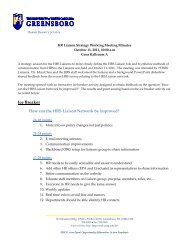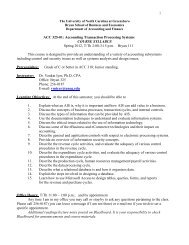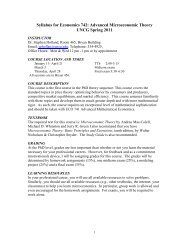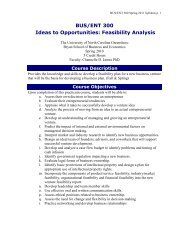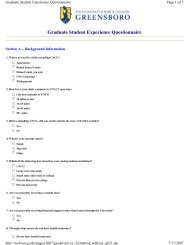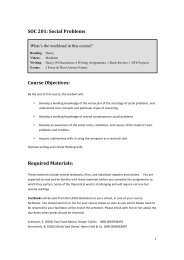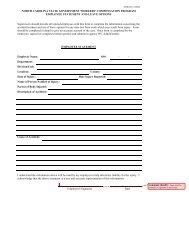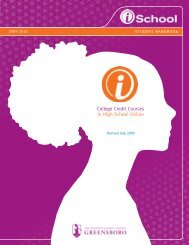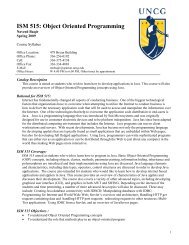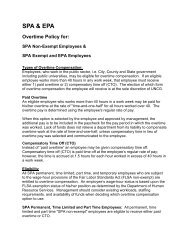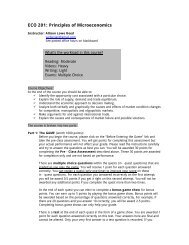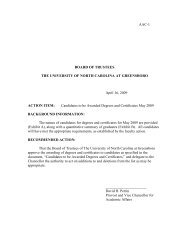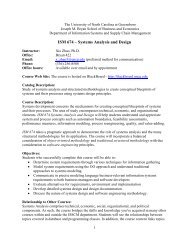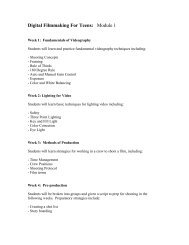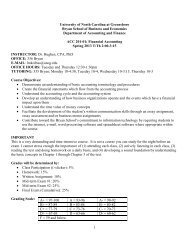1 Accounting 318-01: Intermediate Accounting I Course Syllabus ...
1 Accounting 318-01: Intermediate Accounting I Course Syllabus ...
1 Accounting 318-01: Intermediate Accounting I Course Syllabus ...
Create successful ePaper yourself
Turn your PDF publications into a flip-book with our unique Google optimized e-Paper software.
Academic Integrity Policy:<br />
Each student is expected to complete all requirements of this course in all respects in conformity<br />
with UNCG’s Academic Integrity Policy. The paragraph below, which was taken from this<br />
Policy, highlights students’ responsibilities regarding academic integrity.<br />
Students should recognize their responsibility to uphold the Academic Integrity Policy<br />
and to report apparent violations to the appropriate persons. Students who do not understand<br />
the policy or its application to a particular assignment are responsible for raising such questions<br />
with their faculty member.<br />
For complete information on the policy, please read the Bryan School Faculty and Student<br />
Guidelines at http://www.uncg.edu/bae/faculty_student_guidelines.pdf<br />
<strong>Course</strong> Expectations<br />
• A solid understanding of the concepts, methods, and terminology covered in ACC 218, or courses<br />
equivalent to it, is critical to the mastery of the concepts covered in this course. It is assumed that<br />
students are proficient with the basic mechanics of accounting: journalizing transactions<br />
in good form, posting entries to the general ledger, preparing the trial balance, etc. It is<br />
also assumed that students are familiar with the preparation of the primary financial<br />
statements. If you are not comfortable with your skills in this area, you are well advised<br />
to spend some time consulting your textbook and/or notes from ACC 218 to bring<br />
yourself up to speed.<br />
• <strong>Accounting</strong> <strong>318</strong> is a rigorous and time-consuming course. It requires in-depth study and<br />
analysis and should not be undertaken casually. Here are some steps you may take to avoid<br />
the common "I understand the material, but I just can't do it on the exam" syndrome:<br />
1. Do not take this course in conjunction with a full class load, full-time work and<br />
an extensive social life. One or more of these commitments will have to go. This<br />
course will require a substantial amount of time. You should plan to attend<br />
every class meeting prepared (having read and worked assigned problems<br />
ahead of time!)<br />
2. Avoid too many similarly demanding courses.<br />
3. Stay up-to-date in all assignments.<br />
4. Consult me BEFORE YOU ARE HAVING SERIOUS DIFFICULTIES!<br />
Other Items:<br />
• TURN CELL PHONES OFF BEFORE CLASS AND EXAMS!<br />
• IF YOUR CELL PHONE GOES OFF DURING AN EXAM YOUR PAPER WILL<br />
BE COLLECTED AT THAT POINT AND YOU WILL NOT BE ALLOWED<br />
ADDITIONAL TIME TO COMPLETE YOUR EXAM.<br />
• There are no opportunities for “extra credit” in this course. Exams may not be reworked<br />
for additional points after they have been graded and returned. The homework<br />
assignments may not be reworked or revised, for the purpose of raising the assigned<br />
grade, after they have been graded. No additional work may be performed, for the<br />
purpose of improving the assigned semester grade, after semester grades have been<br />
assigned.<br />
4



